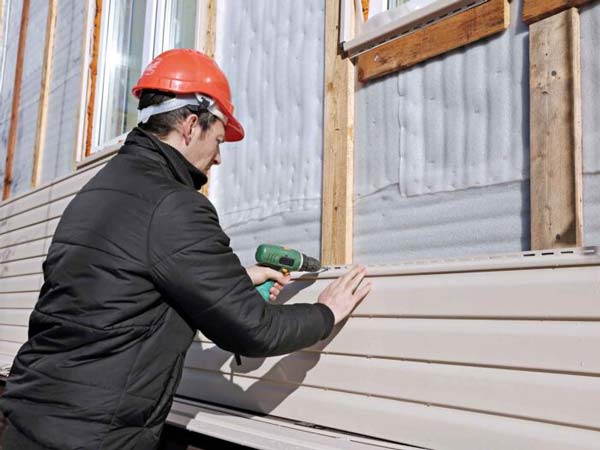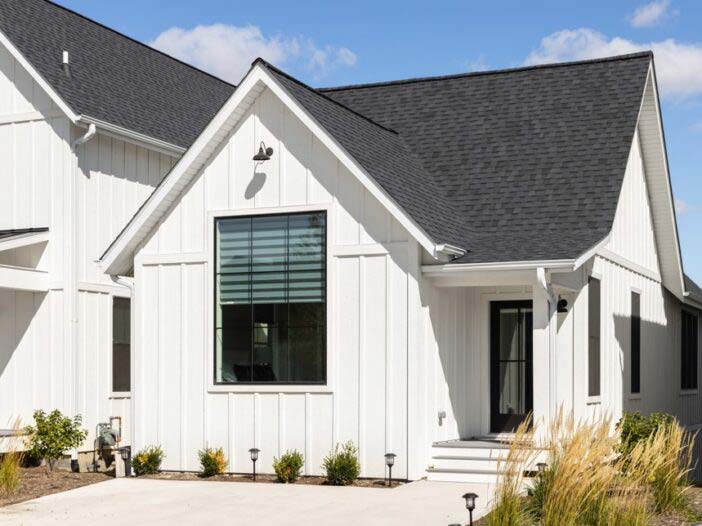With this comprehensive guide, unlock the key factors to discovering the ideal siding contractor in Bellevue, NE.

Crafted from extensive industry insights and expertise, this comprehensive manual distills essential considerations for securing top-tier siding services.
Whether you seek impeccable craftsmanship, adherence to industry standards, or premium materials, this guide navigates you through the crucial elements to prioritize.
Delve into the significance of professional siding installation for safeguarding your home against harsh weather conditions, enhancing insulation, and minimizing long-term costs.
Explore the process of identifying your specific siding needs, from choosing the right siding type to evaluating the extent of required work and setting a feasible budget.
Understanding the Importance of Hiring a Siding Contractor
Benefits of hiring a professional contractor
Hiring a professional siding contractor ensures precision and high-quality workmanship. Experienced contractors know how to estimate the quantity of materials needed, reducing wastage accurately.
They are also aware of best practices to avoid pitfalls that could lead to damage in the future.
Significance of proper siding installation
Properly installed siding is an effective barrier protecting your home from adverse weather conditions, enhancing insulation and significantly reducing energy costs.
Inadequate installation can allow moisture to seep into your property, leading to rotting, mold, structural damage, and a reduction in thermal efficiency.
Cost benefits in the long term due to professional installation
The long-term savings that result from hiring a professional siding contractor are considerable. Ensuring proper installation and use of quality materials will prevent frequent repairs and replacements, ultimately saving on future expenses.
Determining Your Siding Needs
Before hiring a siding contractor, you must ascertain your specific siding needs.

Identifying the type of siding for your home
Identifying the type of siding best suited for your home involves considering various factors to ensure optimal aesthetics, durability, and functionality. Here’s an expanded exploration of this crucial step:
Climatic Considerations:
Begin by assessing your local climate conditions, including temperature fluctuations, humidity levels, and prevalent weather patterns. Certain siding materials perform better in specific climates than others. For instance:
- Materials like vinyl or fiber cement are preferred for their moisture resistance in regions with high humidity or frequent rain.
- Areas prone to extreme temperature variations may benefit from materials with high thermal insulation properties, such as insulated vinyl or fiber cement siding.
Architectural Compatibility:
Evaluate your home’s architectural style and exterior elements to ensure the chosen siding harmonizes with the overall aesthetic appeal. Different architectural styles may lend themselves better to specific siding materials. For example:
- Traditional homes with a classic appeal may pair well with wood siding, offering a timeless charm.
- Modern or contemporary residences often feature sleek lines and minimalist designs, making metal or composite siding a suitable choice.
Maintenance Requirements:
Consider the level of maintenance each siding material demands. While some options require regular upkeep, others offer low-maintenance solutions. Factors to contemplate include:
- Wood siding typically necessitates periodic staining or painting to maintain its appearance and protect against rot and decay.
- Vinyl siding, on the other hand, offers easy maintenance with occasional cleaning, as it is resistant to rot, pests, and moisture damage.
Durability and Longevity:
Assess the durability and longevity of each siding material, factoring in its ability to withstand environmental stressors and resist wear and tear over time. Key considerations include:
- Brick or stone siding boasts exceptional durability and longevity, often lasting for decades with minimal maintenance.
- Fiber cement siding offers a durable alternative with superior resistance to fire, insects, and rot, ensuring long-term performance.
Cost and Budget Constraints:
Determine your budgetary constraints and weigh the initial cost of each siding material against its long-term value and benefits. While some materials may have a higher upfront cost, they could prove more cost-effective over time due to their durability and energy efficiency. Considerations include:
- Brick or stone siding tends to have a higher initial cost but offers excellent durability and requires minimal maintenance, potentially offsetting long-term expenses.
- Vinyl siding is often budget-friendly upfront and requires minimal maintenance, making it a cost-effective option for many homeowners.
Environmental Impact:
Consider each siding material’s environmental impact, considering sustainability, energy efficiency, and recyclability. Opt for eco-friendly options whenever feasible. Examples include:
- Fiber cement siding incorporates sustainable materials like cement, sand, and cellulose fibers, offering a durable and environmentally responsible choice.
- Recycled materials, such as composite siding made from recycled wood fibers and plastics, provide an eco-friendly alternative to traditional siding materials.
Understanding the extent of work needed
Evaluate whether you need a complete siding replacement or just minor repairs. Some damage might be localized, requiring attention only to specific areas, whereas in other cases, a complete replacement may be necessary.
Determining the budget for the project
The budget for the project should encompass all aspects of the installation process, including the cost of materials, labor, and any other expenses that might arise during the project. Remember to factor in the long-term maintenance and durability of the chosen material.
Finding Potential Siding Contractors in Bellevue, NE
Finding the right contractor is often the most challenging part of the process. Fortunately, various ways exist to identify potential siding contractors in Bellevue, Omaha, NE, Moorhead, IA, and the surrounding areas in Nebraska.
Utilizing online resources
Online resources can provide a wealth of information about potential contractors. Many professional siding contractors have websites or social media pages detailing their services, expertise, and contact information.
Relying on local recommendations
Local recommendations are a trusted source of information, as your neighbors or friends may have first-hand experience with a siding contractor. They can give you a candid review about the quality of work, pricing, and customer service.
Reviewing local directories and contractor listings
Local directories and contractor listings are reliable sources for finding siding contractors in your area. These often provide customer reviews and ratings, which can guide your search.
Examining Contractor’s Credentials
One of the crucial steps in hiring a siding contractor is to examine their credentials thoroughly.
Verifying licensing and insurance
Verify that the potential contractor has the necessary licenses to operate in your area. Adequate insurance coverage is also paramount to protect you from liabilities in case of an accident or damage during the project.
Confirming affiliation with professional associations
An affiliation with professional associations, like the National Association of Home Builders (NAHB) or the Vinyl Siding Institute (VSI), indicates a commitment to industry standards and continuous learning.
Checking academic and practical qualification
Academic qualifications and practical experience are paramount for a siding contractor. A background in construction management or a related field and several years of practical experience ensure they have the skills to manage your project effectively.
Reviewing Previous Work and Client Testimonials
Evaluating a contractor’s previous work and client testimonials is an excellent way to gauge their professionalism, skill level, and reliability.
Assessing contractor’s portfolio
A contractor’s portfolio gives you a visual indication of their work. It helps you evaluate their quality of work, aesthetic sense, and how well they managed projects similar to yours.
Comparing Contractor Quotes
Once you have shortlisted potential contractors, the next step involves comparing their quotes.
Ask each contractor for a detailed quote. It should include a comprehensive breakdown of costs for materials, labor, and any incidental costs that might occur during the project.
Negotiating pricing
Don’t shy away from negotiating pricing. High-priced quotes may be brought down with negotiation, or affordable quotes may be confirmed as fair prices.
Making the Final Selection
With quotes compared, you are now in a position to make your final choice.
Ensuring all details are in writing
A written contract must include comprehensive details about the project, such as the total cost, payment schedule, start and completion dates, materials to be used, warranty details, and any other specifics.
Safeguarding against liability and unforeseen circumstances
The contract should also include clauses that protect you from liabilities in case of damages or injuries during the project. Provisions should also be provided for unforeseen circumstances that may cause project delays or additional costs.
Finalizing the contractor that aligns with your needs
Choose a contractor that best aligns with your siding needs, budget, and expectations. Remember, it is a long-term investment, not a choice to be made lightly.
Monitoring the Work Process
Closely monitor the work process even after hiring a professional contractor.
Understanding the project timeline
Ensure you understand the project timeline, including milestones and completion dates for phases.
Keeping a check on the quality of work
Regularly check the quality of work to substantiate the siding installation meets your standards and expectations.
Ensuring work is being completed as proposed
Ensure the project is progressing according to the agreed timeline and quality standards. If there are discrepancies, address them immediately with your contractor.
Providing feedback to contractors for service improvement
Provide feedback to the contractor, highlighting areas they excelled in and areas they might improve. Constructive feedback allows them to refine their services continually.
Remember, selecting the right siding contractor is an important decision that should be made with due diligence. By following this detailed guide, you can find a professional siding contractor in Bellevue, NE, who meets your needs and ensures a high-quality siding installation for your home.
Hire Qualified Siding Contractors in Bellevue, NE, and the Surrounding Areas
Ready to enhance your home’s aesthetics and functionality with premium siding services? Today, take the first step towards securing top-tier craftsmanship by contacting reputable siding contractors in Bellevue, NE!
Contact Stowe Creek LLC at (402) 870-0946 or fill out our request quote form.
